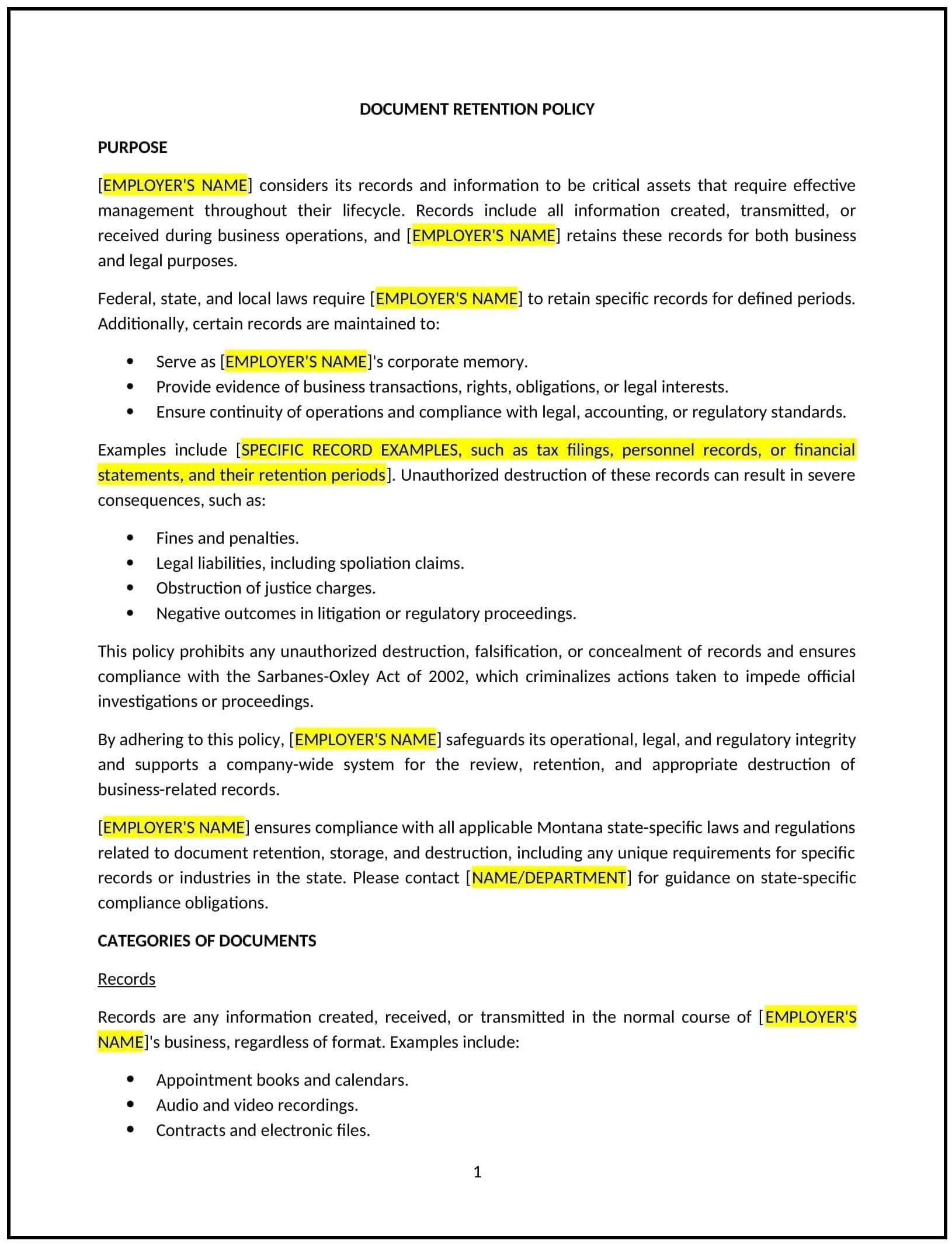Got contracts to review? While you're here for policies, let Cobrief make contract review effortless—start your free review now.

Customize this template for free
Document retention policy (Montana)
A document retention policy helps Montana businesses establish clear guidelines for retaining, managing, and disposing of business records. This policy outlines how long different types of documents should be retained, how they should be stored, and when they should be disposed of to ensure efficiency, data security, and compliance with legal requirements.
By implementing this policy, businesses can reduce clutter, improve organization, protect sensitive information, and ensure that critical documents are kept for the required amount of time.
How to use this document retention policy (Montana)
- Define the types of documents to be retained: Businesses should categorize documents based on their type, such as financial records, employee files, contracts, tax documents, or legal correspondence. The policy should specify which documents need to be retained and for how long.
- Set retention periods: Businesses should outline the specific retention periods for different types of documents, ensuring they comply with legal or industry requirements. For example, tax documents may need to be kept for seven years, while other records might be kept for shorter or longer periods.
- Establish secure storage procedures: Businesses should specify how documents should be stored, whether digitally or physically, and outline security measures for sensitive information. This includes encryption for digital records and locked cabinets for physical documents.
- Define the process for disposing of documents: Businesses should establish procedures for securely disposing of documents once they have reached the end of their retention period. This may include shredding physical documents or using secure digital deletion methods.
- Ensure accessibility and accountability: Employees should know where documents are stored and who is responsible for managing and accessing them. Clear guidelines should be provided for retrieving documents when needed.
- Address exceptions and legal holds: The policy should outline procedures for handling exceptions, such as retaining documents under a legal hold, for litigation or regulatory investigations, even if they would normally be disposed of.
- Review and update regularly: Businesses should periodically review the document retention policy to ensure it remains aligned with current legal requirements, technology advancements, and business needs.
Benefits of using this document retention policy (Montana)
This policy provides several key benefits for Montana businesses:
- Improves organization: A clear document retention policy helps businesses manage records efficiently, ensuring important documents are easy to find when needed.
- Reduces risk: By properly disposing of outdated or unnecessary documents, businesses minimize the risk of storing sensitive information that could be exposed to unauthorized parties.
- Enhances compliance: A well-defined retention policy helps businesses stay compliant with state and federal regulations regarding data retention, audits, and record-keeping.
- Increases operational efficiency: Streamlined document management reduces the time spent searching for files, leading to increased productivity and efficiency in the workplace.
- Protects sensitive information: Secure storage and disposal processes protect confidential data, helping businesses maintain the trust of employees, clients, and stakeholders.
- Reduces clutter and saves space: By disposing of unnecessary documents, businesses free up physical and digital storage space, allowing for better organization and reducing operational costs.
Tips for using this document retention policy (Montana)
- Communicate the policy clearly: Ensure all employees understand the types of documents that need to be retained, where they are stored, and the procedures for disposal.
- Implement secure document storage: Use secure digital storage systems with encryption and password protection for sensitive records. For physical documents, invest in locked storage solutions.
- Regularly audit document retention practices: Conduct periodic audits to ensure that records are being stored and disposed of according to the retention policy.
- Make the retention process efficient: Develop systems to automate document retention and disposal processes, particularly for digital records, to reduce manual effort and minimize errors.
- Educate employees on the importance of the policy: Regularly educate employees about the importance of document retention for legal, security, and business reasons.
- Ensure clear responsibility for records management: Assign specific employees or departments to oversee document retention, ensuring accountability for compliance with the policy.